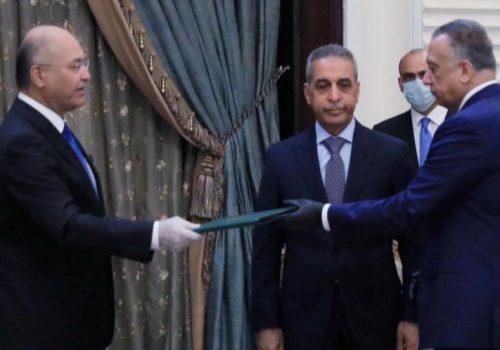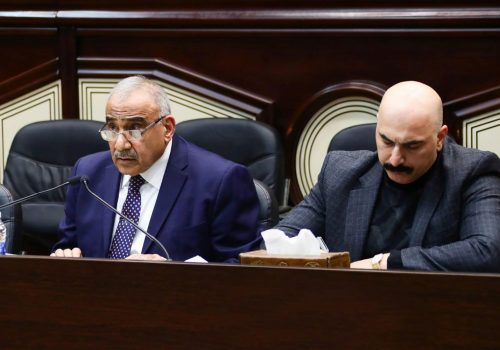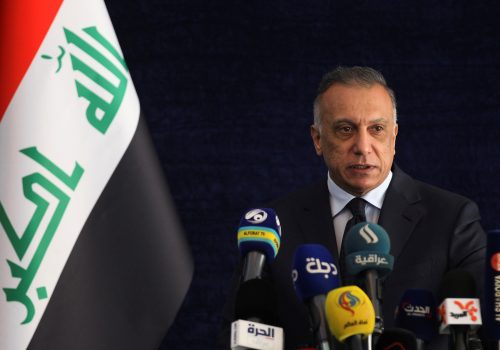Sistani’s roadmap to the renewal of political legitimacy in Iraq
Grand Ayatollah Ali Sistani released his first public political message since the formation of Prime Minister Mustafa al-Kadhimi’s government on May 7, addressing the most salient challenges Iraq is facing. While meeting with the United Nations’ Secretary-General’s Special Representative for Iraq Jeanine Hennis Plasschaert, Sistani emphasized three short-term priorities for Iraq’s government: a timely, free, and fair snap election, extending government authority over all Iraqi soil, and protecting Iraqi sovereignty against all foreign interference. Ayatollah Sistani’s office released a public statement on September 13 outlining his vision and guidelines for what Iraq urgently needs at this critical time.
Sistani made a deliberate choice to send the message in a meeting with the UN representative. While his statement can be interpreted as a form of support for the current Iraqi government, this support is not unconditional. Iraqi leaders are still unable to secure an audience with the Grand Ayatollah and, until they earn it by making measurable accomplishments, this situation will likely remain. Sistani’s message also underscores to all foreign powers in the region and beyond that their interference will no longer be tolerated if they advance their own interests at the expense of Iraqi national interests. Finally, Sistani’s decision to tie his comments to his meeting with the UN special representative is a reminder to the intergovernmental organization that it can, and must, play its proper role to help Iraq overcome its domestic and international crises.
Unpacking Sistani’s points about the way forward for Iraq
Sistani’s first point is related to the upcoming snap election that was set for June 6, 2021 if the Iraqi Council of Representatives cooperates by voting to dissolve itself by April 7, 2021. Sistani’s statement properly cautions the Iraqi government that “the early election is not an end in and of itself, but a means to leading Iraq out of its current conundrum that is caused by political, economic, security, health, and services shortcomings.” Sistani’s vision requires an election that allows the Iraqi people to freely reevaluate their political choices and elect their representatives according to transparent rule of law without improper influence or coercion. Sistani also called on the United Nations to play its proper role in monitoring the elections to ensure their legitimacy and adherence to international standards.
Sistani’s second point emphasized the importance of combatting corruption, placing all weapons under state control, and reversing Iraq’s division into sections controlled by various parties or armed groups. Sistani called on the Iraqi government to identify and hold accountable all the culprits in the violence that caused the deaths and injuries among the demonstrators and Iraqi security forces in Baghdad and several other provinces since October 2019. The statement correctly argued that holding these transgressors accountable is important for the administration of justice and for deterring others from repeating such acts.
The third point in Sistani’s statement called for the protection of Iraqi sovereignty and the prevention of its violation. Like the previous points, Sistani attributes Iraq’s vulnerability to the pervasive ethno-sectarian conflict among Iraqi leaders who place their own interests and the interests of their respective regions and parties ahead of the country’s interests. For Sistani, the protection of Iraqi sovereignty is a priority to maintain the unity of Iraq and prevent it from being divided.
Sistani’s statements have always been received selectively by Iraqi political leaders. They often cling to the sections that benefit them and ignore or procrastinate on inconvenient elements. Everyone in the political class, for instance, celebrated Sistani’s June 13, 2014 fatwa that called on ordinary Iraqis to carry arms, fight the Islamic State of Iraq and al-Sham (ISIS), and save the Iraqi political regime from collapse. Meanwhile, his August 7, 2015 fatwa to strike with an iron fist all those who misappropriate public funds went completely unheeded. For this reason, Sistani stopped receiving Iraqi politicians under any circumstances. Indeed, the last Iraqi prime minister to meet him was Haider al-Abadi.
Although they have not been overseeing Iraq alone, there is a tendency to blame the Shia political leaders for the government’s abject failure in running the state and its widespread corruption. Much of the blame and resentment often spills over to include Ayatollah Sistani’s clerical network for the initial support and political credit that was extended to the Shia Islamist parties. Having discovered the liability they posed to him, Sistani began to distance himself from Shia politicians, particularly by rejecting their requests for audience and instructing his authorized representatives to step up their criticism of the government’s performance.
It is most apt to call Sistani’s latest message a provision of another chance rather than firm support for the Iraqi government. To claim unequivocal support from Sistani, Prime Minister Kadhimi needs to take enough tangible steps on reform and combatting corruption to secure a meeting with the Grand Ayatollah.
Dr. Abbas Kadhim is director of the Atlantic Council’s Iraq Initiative. Follow him on Twitter @DrAbbasKadhim.
Image: Iraqi demonstrators display a poster of Iraq's top Shia cleric, Ayatollah Ali al-Sistani outside the tent during ongoing anti-government protests in Najaf, Iraq February 6, 2020. Picture taken February 6, 2020. REUTERS/Alaa al-Marjani


